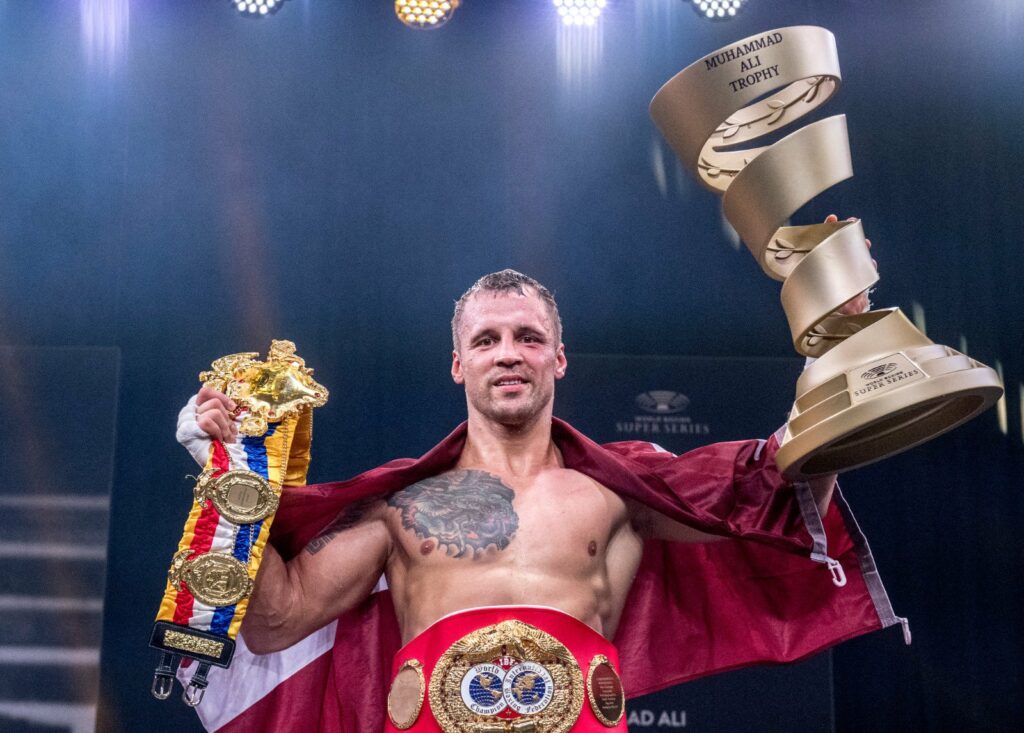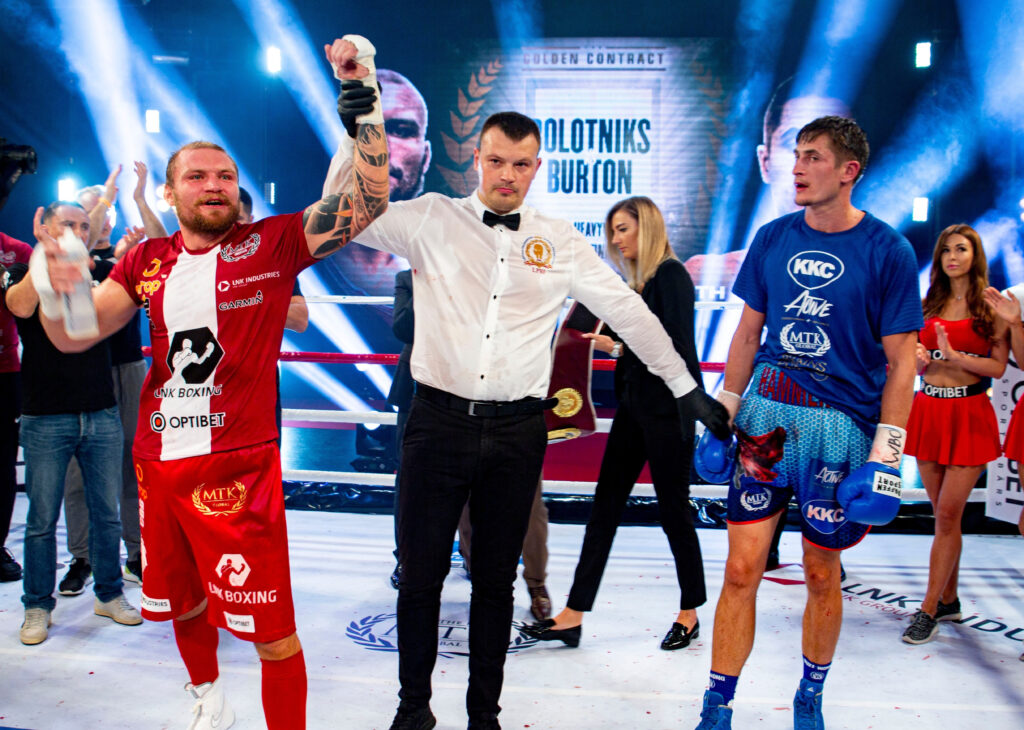Ahead of tonight’s Golden Contract finals featuring Jazza Dickens vs Ryan Walsh and Ricards Bolotniks vs Serge Michel, IBHOF inductee Graham Houston looks back on a long history of pro boxing tournaments.
Tournaments are a lot of fun and we’ve been seeing more of them lately.
This year saw the final bout in the World Boxing Super Series cruiserweight tournament when Mairis Breidis outpointed Yuniel Dorticos on neutral ground in Germany.

Photo: WBSS.
Ultimate Boxxer is up and running again after the Covid-19 lockdown. Quebec has its Square of Aces welterweight tournament, with Yves Ulysse and Steve Claggett each winning their bouts to set up a rubber match in the tournament final, while losing semi-finalists Mathieu Germain and David Theroux clash on the same show.
And this Wednesday fans get to see two excellent, even-money fights in MTK Global’s Golden Contract finals in the featherweight and light-heavyweight divisions, with Ryan Walsh meeting Jazza Dickens at 126 pounds while Ricards Bolotniks faces Serge Michel in the 175 pounds box-off.
Bolotniks is Latvian and Michel is a German boxer but I don’t think the nationalities matter much to UK fans, who just want to see a good fight — and these fighters have introduced themselves to the British viewing audience.
That’s the thing with tournaments. Viewers see boxers fight their way through and they get to know the contestants. Bolotniks has caused two surprises, blasting out Ireland’s Steven Ward in the opening round in the quarter-finals and then soundly outpointing tournament favourite Hosea Burton in the semi-finals. Michel outclassed Scotland’s Tommy Philbin in his opening bout and then very impressively stopped former British title challenger Liam Conroy in the semi-finals.

Photo: MTK Global.
Now the Bolotniks vs Michel final is eagerly awaited, as is the Walsh vs Dickens featherweight final.
And talking of tournaments, Matchroom Boxing’s Prizefighter series produced lively entertainment, with three bouts of three three-minute rounds on the same night. Audley Harrison resurrected his career by winning the Prizefighter heavyweight tournament. Matchroom moved on from this event but the Ultimate Boxxer format is similar.
The three-bouts-in-one-night tournament was actually started way back in the 1950s when promoter Jack Solomons featured a heavyweight novices competition on his big shows. When Solomons started promoting on a smaller scale with his World Sporting Club shows at London’s Grosvenor House hotel he reintroduced the heavyweight novices competition.
Future British heavyweight champion Danny McAlinden, of Coventry by way of Northern Ireland, won a 1969 tournament with three KO wins in one night. In his opening bout of the tournament, McAlinden knocked out Yorkshire southpaw Richard Dunn in the first round. McAlinden and Dunn were making their professional debut. Who could have dreamed that both men would go on to win the British championship and that Dunn would one day share the ring against Muhammad Ali in a world title fight? What would have been the odds on that?
The World Boxing Super Series gave fans worldwide what they want to see more than anything else: The best meeting the best. We’ve seen so many elite fighters and high-quality match-ups in this series. And the organisers did very well indeed to find a venue for Briedis vs Dorticos in this time of Covid-19 uncertainty.
Then there was the Super Six World Boxing Classic, brainchild of the Showtime network in the US. The idea was that the six best boxers in the super-middleweight division would meet to decide the world’s best at 168 pounds. The problem here was that the tournament went on a little too long, from 2009 to 2011. And it got a little confusing due to the bracket system. By the time Andre Ward met Carl Froch in the final the tournament had lost momentum. But the Super Six gave fans some memorable bouts, such as a tremendous fight between Mikkel Kessler and Carl Froch in Denmark.
There was a tournament to find a new welterweight champion in 1958, Carmen Basilio having won the middleweight title by defeating Sugar Ray Robinson the previous year. It was so simple back then. In those days there weren’t multiple world sanctioning bodies. Fighters ranked in the top spots in The Ring magazine’s ratings were selected, the publication’s venerable editor Nat Fleischer gave his blessing to the tournament, and that was that.
Vince Martinez, a stylish boxer from New Jersey, faced Philadelphia’s tough Gil Turner in one welterweight semi-final, while a heavy hitter from St Louis, Virgil Akins, met Cuba’s Isaac Logart in the other semi-final. Martinez and Akins came through. Akins had home advantage in St Louis for the final against Martinez. “The local fighter was the favorite in the betting at 2 to 1 at ring time, and it was plain that the odds-makers had this one properly figured,” the New York Times reported. Akins dropped Martinez nine times in scoring a fourth-round KO.
My all-time favourite tournament? That would be the one in the late 1960s organised by the WBA to find a successor to Muhammad Ali, whose career was in limbo due to his refusal to be inducted into the US military.
I have fond memories of this tournament because I lived in London at the time and the tournament was picked up by BBC2 television for live viewing. Actually the tournament was joined in progress, the initial two bouts, Thad Spencer outpointing Ernie Terrell and Jimmy Ellis stopping Leotis Martin (who suffered a lacerated lip), not being shown. But the UK got to see the remainder of the tournament, with names such as Floyd Patterson, Jerry Quarry, Karl Mildenberger and Oscar Bonavena competing. It was a magical experience, as live boxing events in the US were simply never seen on British TV at the time.
It’s a long way from the WBA heavyweight elimination series to the Golden Contract, a lot of years in between, but it’s good for the fans — and good for boxing — that the tournament format is alive and well.
Main image: Dickens and Walsh meet in the Golden Contract 126lbs final tonight. Photo: MTK Global.